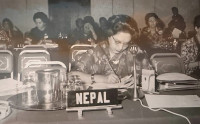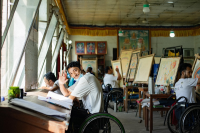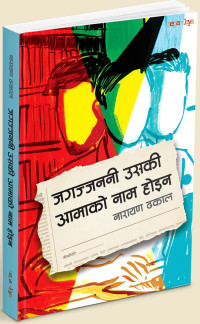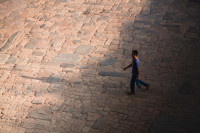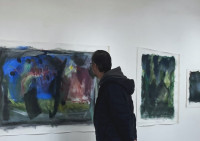Culture & Lifestyle
Music as a form of storytelling
Manka Band, a group of local musicians from Godavari, have taken on the mantle of preserving cultural knowledge through music.
Rose Singh
When Manka Band was cofounded by Sabir Maharjan and Laxman Maharjan ten years ago, the idea of the band was simple—to make good music. Over the years and after many concerts however, the band began to realise that music could also be a medium for cultural preservation.
Manka, which has its roots in Newa Bhasa, means unity, which is reflected in the various instruments that it uses. The band is rooted in exploring traditional instruments in fusion with western instruments as a part of their creative process.
It was when the pandemic hit that Rijan Maharjan, another member of the Manka Band, wanted to learn how to play the ‘Tungna’, a traditional musical instrument played by communities in the Himalayan region. But to his dismay, he found no one to teach him how to play the instrument.
The instance wasn’t unique to Rijan. Band member Arjeet Maharjan, also realised that were very few places where he could learn the ‘Dhime,’ another traditional musical instrument.
As they began to self-learn these instruments, the band recognised a growing decline in people who could carry forward the culture and music of their community in Godavari.
“Music is the medium through which people connect with their culture. A decline in people well versed with such integral cultural knowledge meant that something wasn’t right,” says Obhaso Shakya, the band manager.
Soon, the band began working on ways to preserve cultural instruments. The way out for them was approaching the local-level representatives.
In March 2023, the band registered itself as a cultural music organisation. Soon after, they approached the ward office at Godavari Municipality with a budget proposal that sought funding to teach the local people about indigenous instruments.
According to Shakya, every ward office in the country gets a budget that is allocated for the promotion and preservation of cultural elements. “The interesting thing is, despite the provision being there, it is hardly known to the general public,” he says.
However, it wasn’t only the lack of instrumental knowledge among locals that prompted the band to approach the local authorities.
Over the years, the members noticed a disjunction regarding the newer generation’s knowledge of cultural values. Rijan recounts how the Newa festival of ‘Lakhey’ dance is known to people more as an entertaining event than it is as a tradition that has cultural stories associated with it.
He reveals that ‘Lakhey’ originates from the Newa words ‘La’ (meat) and ‘Khey’ (eggs) and that it has many versions. In all these versions, ‘Lakhey’ is synonymous with a negative energy associated with demons that eat humans.
The ‘Majipa Lakhey’ story revolves around how a demon falls in love with a girl and takes a human form to be with her. When his reality as a demon is discovered, he’s put in confinement, and the king releases him on the promise that he won’t harm any human beings.
The ‘Lakhey’ of Thecho, Lalitpur, ‘Yamantak Bijaya’, for instance, is associated with the war between a king and a demon. The demon who lived in forests came a crossroads with the king during one of the king’s hunting endeavours. Owing to the demon’s fascination with humans, they began to fight. The demon proved to be a powerful creature, and the king couldn’t kill him, and only held him hostage.
In the act of truce, the king promised to release the demon on the condition that the demon wouldn’t harm anyone and would be worshipped by people once a year.
“This story isn’t widely known, and people usually enjoy the ‘Lakhey’ dance without understanding the gravity of cultural and sentimental values that the festival carries,” says Rijan.
Manka Band, thus, kick-started their two-fold objective not just to protect and promote knowledge of cultural instruments among the newer generations but also to use music as a medium to educate local people about the cultural values behind festivals. Their music, thus, features such stories embedded within the lyrics and composition.
However, they reveals that things haven’t been easy. Since the band is mostly made up of students aged 19 to 25, it has become difficult to sustain themselves. “Taking a civic responsibility to preserve culture becomes taxing, financially and emotionally,” says Rijan. “My father, who himself played music during festivals, sees no future in learning instruments,” he says.
He reveals that the only time musical instruments get played is during festivals, which happens once or twice a year. During other times, learning instruments seems futile as the cultural significance attached to it are slowly declining.
“Due to a lack of financial stability associated with learning instruments, people are often discourged from learning them,” he says. However, this only acts as motivation for the band.
“I would rather teach people for free without getting anything in return than let the culture of music, and its relation to tradition die away. Death of music is equivalent to the death of culture,” he says.




 18.95°C Kathmandu
18.95°C Kathmandu
